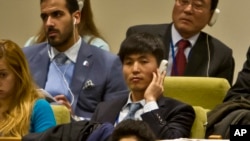The U.N. General Assembly’s human rights committee voted Tuesday to ask the Security Council to consider referring North Korea’s grave human rights situation to the International Criminal Court.
By a strong majority, countries voted to press for accountability for abuses committed by the Pyongyang regime.
Sponsored by the European Union and Japan, the resolution was based on the findings of an independent special rapporteur appointed by the U.N. secretary-general, and on a Commission of Inquiry report. That report, which included testimony from more than 80 victims and witnesses, detailed widespread, systematic and gross human rights violations including torture, arbitrary detention, enforced disappearances, executions and inhumane treatment.
U.S. Ambassador Elizabeth Cousens told the committee that the North Korean rights situation demanded a strong international response.
“With this resolution ... the international community must send a clear message to the DPRK regime that human rights violations must stop and that those most responsible will be held accountable,” she said.
Pyongyang lobbying fails
The North Koreans lobbied hard in the lead-up to Tuesday’s vote to try to get the reference to the International Criminal Court removed from the draft resolution, dangling the possibility of allowing a visit for the special rapporteur. When that failed, Cuba sponsored an amendment seeking to cut the reference, but it was voted down in the committee.
Choe Myong Nam, deputy director-general of North Korea’s U.N. mission, told the committee that the draft resolution was the product of political and military confrontation and plots against his government. He said the Commission of Inquiry report was full of “fabricated testimonies” from a handful of criminal defectors. He accused the United States and its allies of being behind a campaign against Pyongyang, and he appeared to threaten the resumption of internationally forbidden nuclear tests.
“The outrageous and unreasonable human rights campaign staged by the United States and its followers in their attempts to eliminate the state and social system of the DPRK is compelling us not to refrain any further from conducting nuclear tests,” he said.
This was the 10th time North Korea’s rights record had come in for annual scrutiny at the General Assembly.
In all, 111 countries supported the call for further action, while 55 abstained — nearly half of them African nations that have mixed feelings about the ICC.
Just 19 'no' votes
Pyongyang’s international isolation was evident, as only 19 countries voted against the measure — mainly other states with questionable rights records or ones that are subject to similar scrutiny by the General Assembly’s human rights committee. They included Iran, Syria, Cuba, Venezuela, Zimbabwe and Belarus.
Security Council members China and Russia voted against the measure, which could veto any effort to refer North Korea to the ICC in the 15-nation council. Human Rights Watch's U.N. director, Philippe Bolopion, told VOA that ignoring North Korean human rights abuses would be a very shortsighted strategy.
“We hope that Russia and China will hear the very united voice of the international community and allow the U.N. Security Council to finally refer the situation in North Korea to the International Criminal Court,” he said.
Bolopion said Tuesday’s vote was “historic” and a “huge victory” for the victims of the Pyongyang regime.
In the coming weeks, the draft resolution will go to the General Assembly for formal adoption.




